GeoVision GV-NVR User Guide
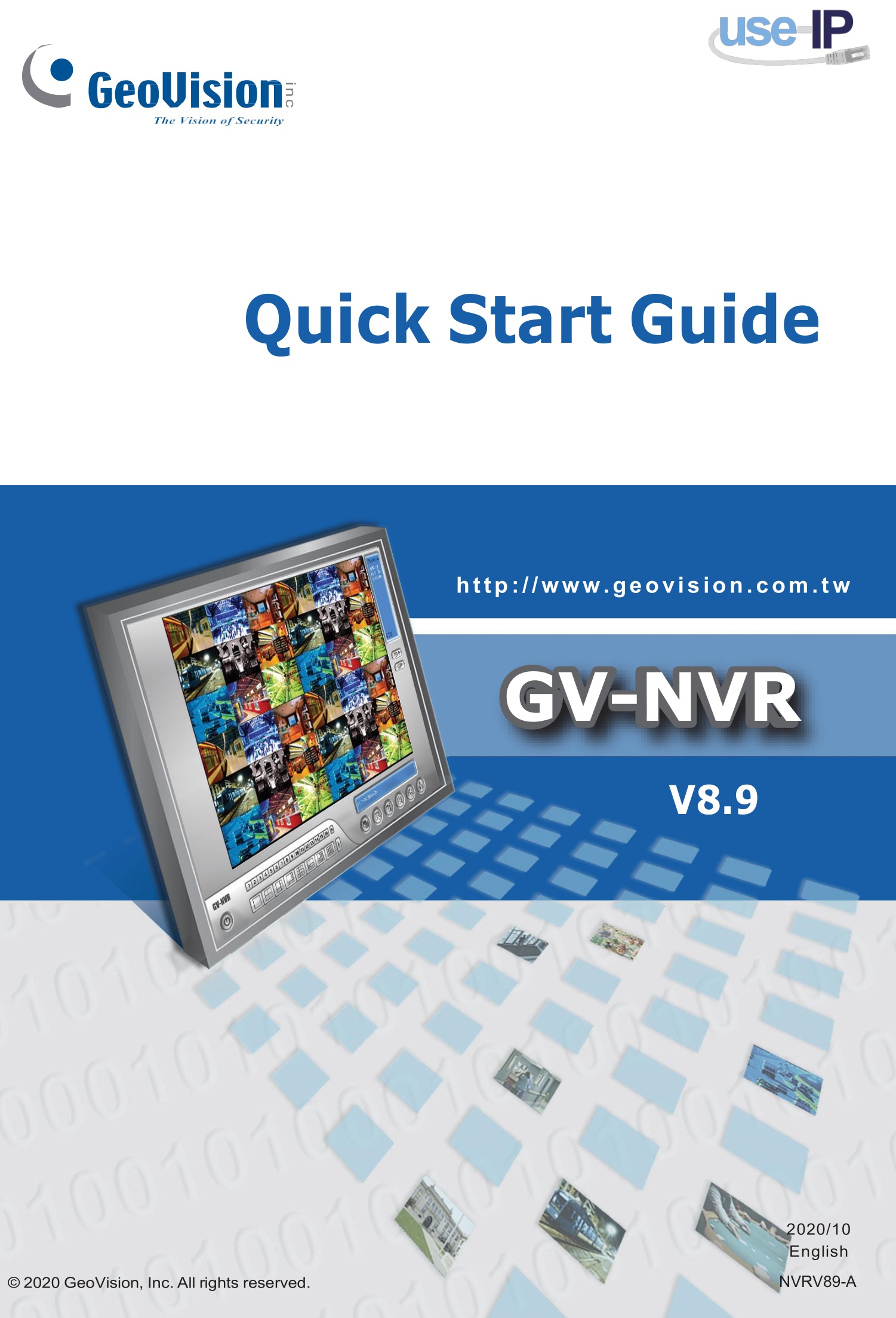
Introduction
Welcome to GV-NVR Quick Start Guide. In the following sections, you will learn the basic requirements and configurations of GV-NVR. For the detailed instructions of use, see GV-DVR/ NVR User’s Manual on our website.
Note: GV-NVR automatically comes with 32 free IP channels for GeoVision IP video devices. To connect third-party IP devices, you need to purchase an NVR Dongle installed to the computer.
Packing List
- Software DVD x 1
- Protection Key (NVR Dongle) available upon order x 1
Types of Dongle Options
Two types of USB dongles are available to connect with third-party IP devices: External-type NVR Dongle and Internal-type NVR Dongle. The dongle options include 1, 2, 4, 6, 8, 10, 12,14, 16, 18, 20, 22, 24, 26, 28, 30 and 32 IP channel(s).
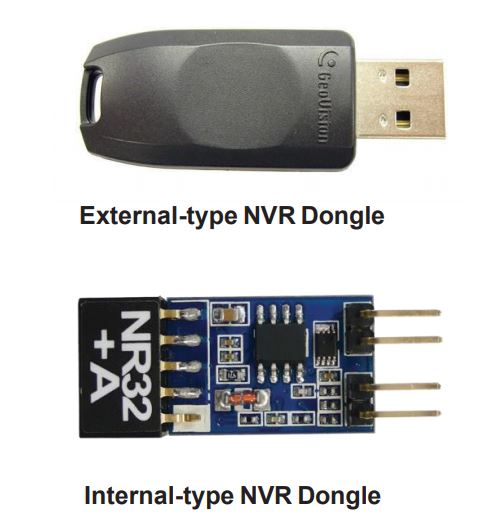
Internal-type NVR Dongle is not only used for connecting third-party IP video devices, but also built with Hardware Watchdog function which restarts the computer when Windows crashes. The dongle is inserted to the USB header on the motherboard. For details on supported third-party IP camera models, please visit GeoVision’s website.
System Requirements
GV-NVR system can support up to 32 channels. The following table lists the minimum system requirements needed to run GV-NVR.
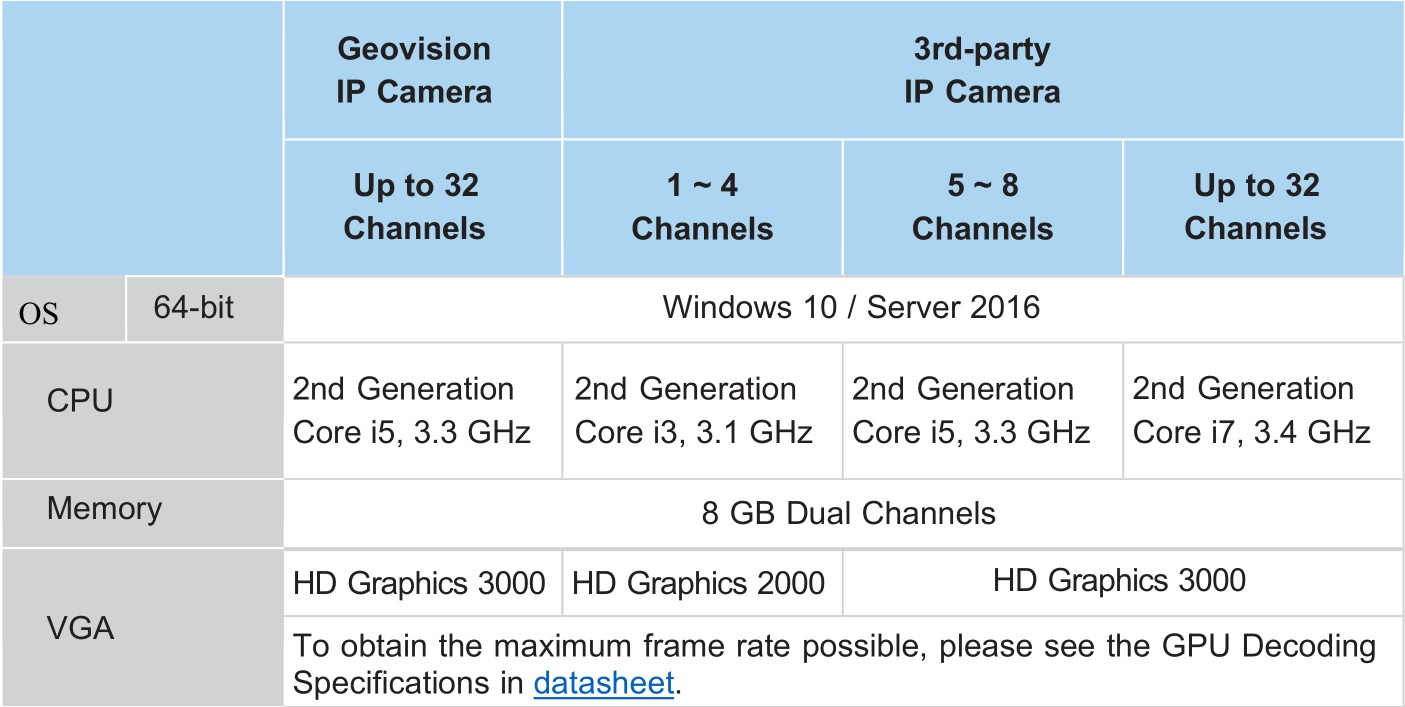
Note:
- GV-DVR / NVR / Hybrid DVR software has ended support for Windows 8.1 / 8 / 7 / XP / Vista /Sever 2012 R2 / Server 2008 / Server 2008 R2.
- The system requirements are determined in round-the-clock setting with live view only, while remote connections and video analysis features being disabled.
IMPORTANT:
Some GeoVision hardware accessories and GV-DVR functions are not available for GV-NVR users. Please note the following unavailable functions:
- Adjustment of codec and resolution for third-party devices
- Recording quality
- Pre-Recording using RAM
- Hard Disk Calculator
- Noise Detection to reduce file size
- Video Lowpass Filter
Options
Optional devices can expand your GV-NVR’s capabilities and versatility. Contact your dealer for more information
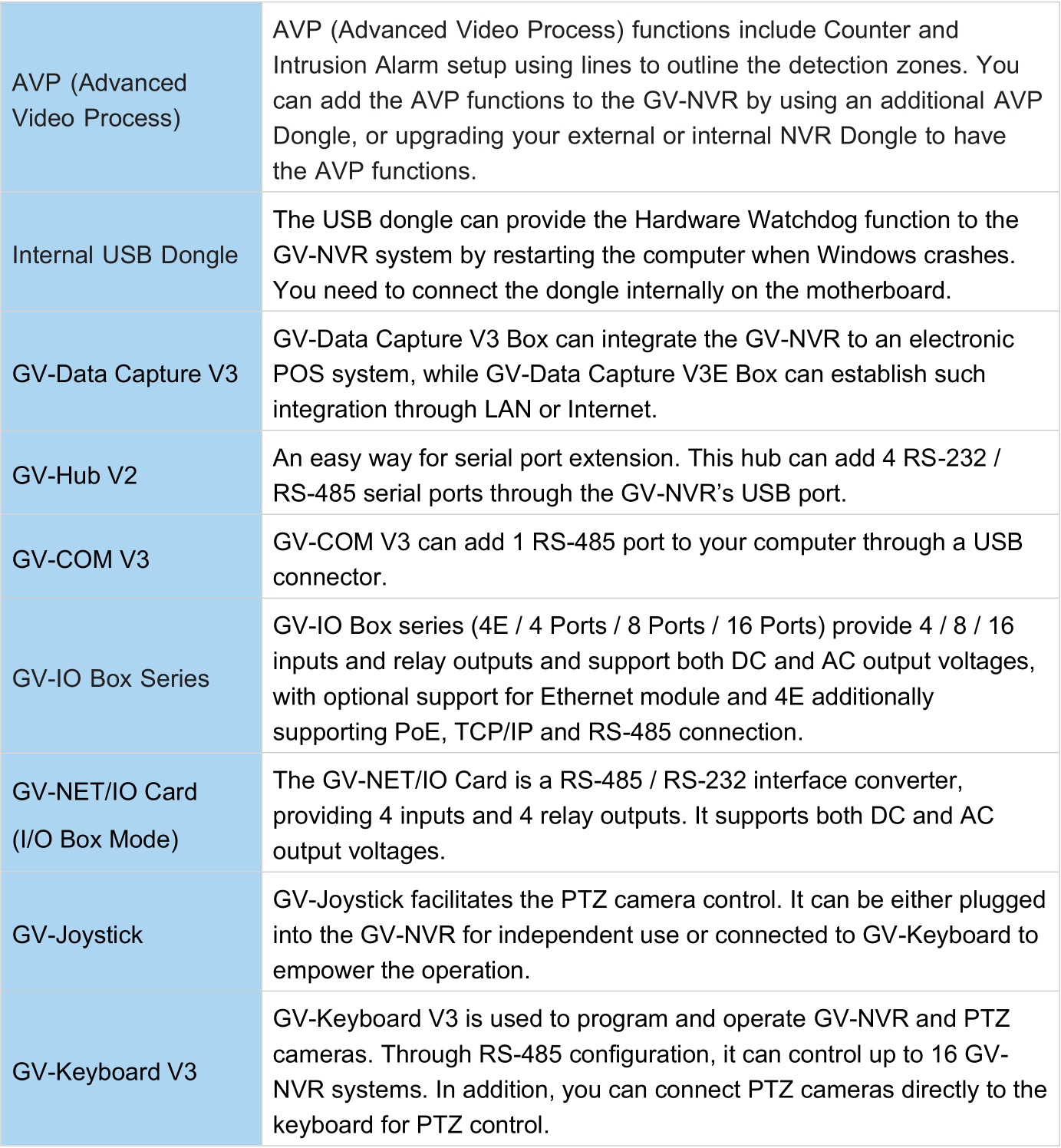
USB USB Driver Driver Installation Installation
It is required to install the driver of USB dongle before use. After you insert the USB dongle to the computer where GV-NVR is installed, the Found New Hardware Wizard will automatically detect the device. Ignore the Wizard and follow these steps to install the driver:
1. Insert the Software DVD. It will run automatically and a window pops up.
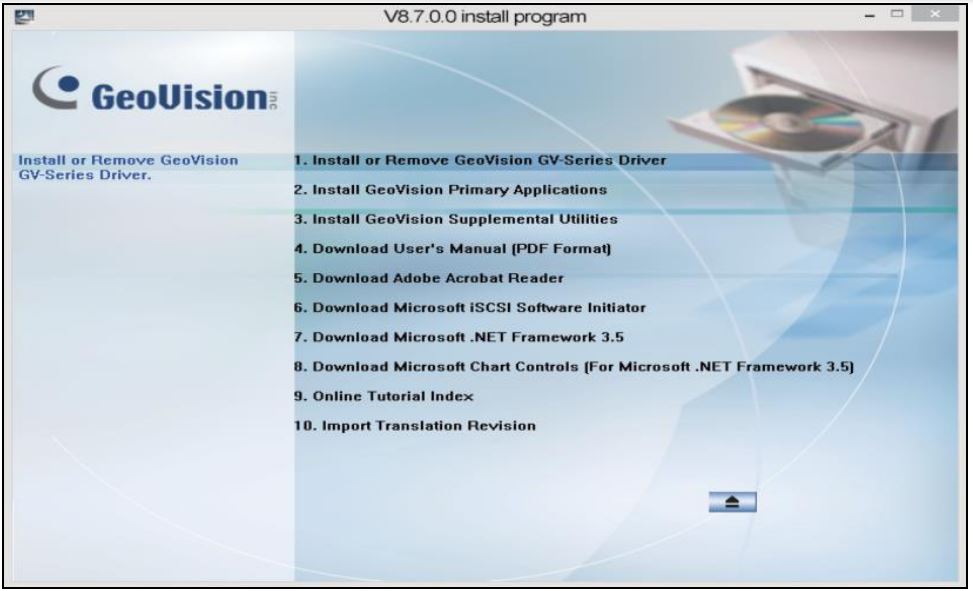
2. Select Install or Remove GeoVision GV-Series Driver, and then click Install GeoVision USB Devices Driver. This dialog box appears.
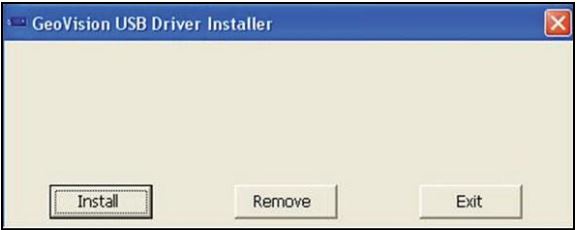
3. Click Install to install the driver. When the installation is complete, this message will appear: Install done!
4. To verify that the driver is installed correctly, go to Windows Device Manager and expand DVR-Devices. You should see the entry of GV-Series USB Protector.

System Installation
Before You Start
For optimal performance of your system, it is important to follow these recommendations before installing GV-NVR:
- It is strongly recommended to use two separate hard disks. One is for installing Windows OS and GV-NVR software, and the other is for storing recorded files and system logs.
- When formatting the two hard disks, select NTFS as the file system.
- When GV-NVR is running, it is not recommended to perform disk defragmentation
- Since the size of transmitted data from IP cameras may be quite large and reach beyond the transfer rate of a hard disk, you should note the total of recording frame rates that you can assign to a single hard disk, as listed below:
Frame rate limit in a single hard disk

The frame rate limit is based on the resolution of video sources. The higher video resolutions, the lower frame rates you can assign to a single hard disk. In other words, the higher frame rates you wish to record, the more hard disks you need to install. For the information of recording frame rates, you may consult the user’s manual of the IP camera that you wish to connect to.
Installing GV-NVR
To install the GV-NVR, follow these steps:
- Insert the Software DVD. The Install Program window pops up automatically.
- Click Install GeoVision Primary Applications.
- Select GV-DVR/NVR, and follow the on-screen instructions.
- Follow the above steps to install other programs one by one.
Note: Special characters ‘@’ and ‘:’ are not supported to be used as the login username and/or password of GV-DVR / NVR.
Adding IP Video Sources
The procedures for adding an IP camera, Video Server and Compact DVR may vary. The following is the setup procedure for an IP camera in the system.
1. On the main screen, click the Configure button, select System Configure and click IP Camera Install. This dialog box appears.

- To add an IP camera from a list of the IP cameras on the LAN, click Scan Camera.
- To manually set up an IP camera, follow steps 2 to 7.
2. Click Add Camera. This dialog box appears

3. Type the IP address, username and password of the IP camera. Keep or modify the default HTTP port 80. Select a camera brand and device from the drop-down list. This dialog box appears.
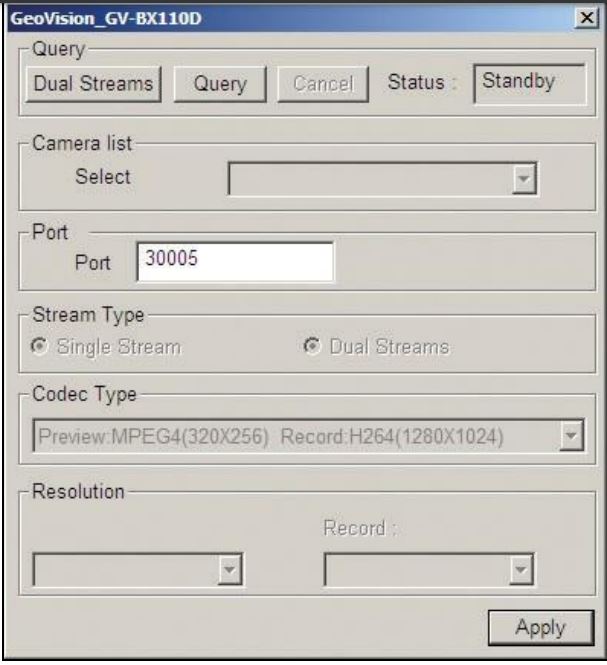
4. The options in the setup dialog box may vary depending on the camera brand.
- Port: Video streaming port number.
- Stream Type: You may have the option of single streaming only or both single and dual streaming.
- Codec type: You may have the option of MPEG4, JPEG, or H264 / H265. If the selected camera supports dual streaming, the preview codec and recording codec can be set differently.
- Resolution: Select resolutions for preview and recording.
5. Click Apply. The IP camera is added to the list.6. Click the listed camera, and select Display position to map the IP camera to a channel on the GV-System.

7. The Status column now should display “Connected”. Click OK
For more details, see Hybrid and NVR Solution, Chapter 2, see GV-DVR / NVR User’s Manual on our website.
Upgrading GV-NVR
The Black Dongle can be upgraded to include more functions or enhance the system. You need to collect the data from your dongle and send it back to GeoVision for an upgrade. The upgrade is charged services. To upgrade your dongle, follow these steps:
1. Each dongle has its own serial number. Find it on the side of the dongle. Later this serial number will be used in naming the files for upgrading.

2. Insert the dongle to the computer.3. In the GV folder, double-click GVUsbKeyUpClient.exe. This dialog box appears.
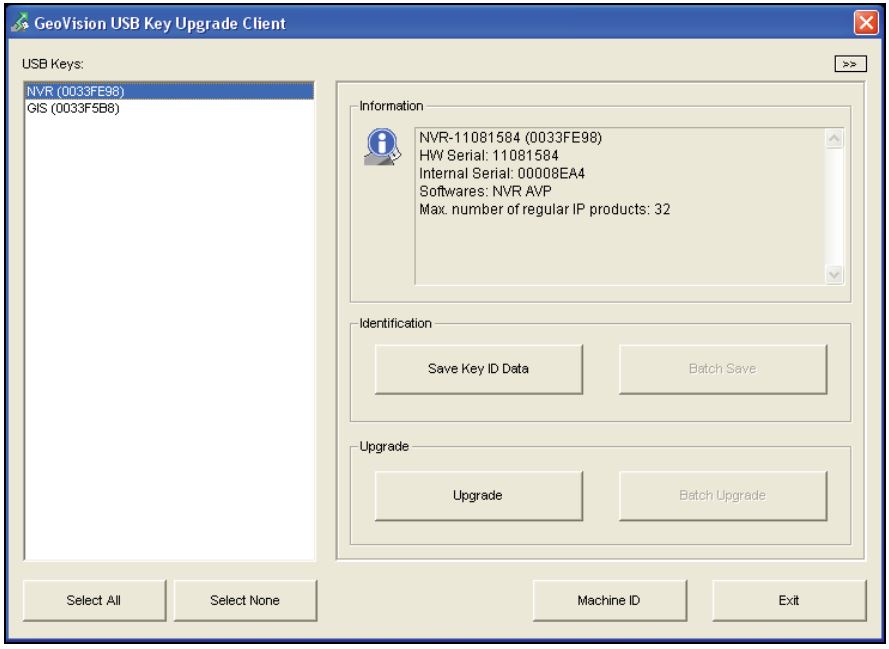
4. To retrieve the data from the dongle, click Select All. The information of the dongle will be displayed in the information field. Note the displayed number of “HW Serial” should be the same as that on the dongle.
5. To save the data to your local computer, click Save Key ID Data. If you have more than one dongle to upgrade, click Batch Save. Different dongle data will be saved as separate files. The file will be named after the serial number on the dongle and saved as *.out. For example, if a dongle serial number is 7116442, the file is named “NVR-7116442.out”.6. Send this data file to GeoVision at [email protected]. The GeoVision will examine the data file and send an *.in file back to you. The file name also includes the serial number of that dongle. In this example, the data file to be sent back is named “NVR7116442.in”.
7. After you receive the updated file, insert the correct dongle matching the .in file you receive, and then run GVUsbKeyUpClient.exe.8. Click Select All to read the dongle, click Upgrade and then open the updated file to upgrade the dongle. You can also select more than one dongle in the list and click Batch Upgrade to upgrade them at the same time. Make sure these dongles match the updated files you receive.
![]()
9F, No. 246, Sec. 1, Neihu Rd.,Neihu District, Taipei, Taiwan Tel:+886-2-8797-8377Fax: +886-2-8797-8335[email protected]http://www.geovision.com.tw
References
[xyz-ips snippet=”download-snippet”]

